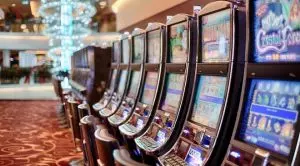 The gambling businesses operating in the Isle of Wight has remained steady in number since 2010, despite the recently unveiled crackdown on controversial fixed-odds betting terminals (FOBTs).
The gambling businesses operating in the Isle of Wight has remained steady in number since 2010, despite the recently unveiled crackdown on controversial fixed-odds betting terminals (FOBTs).
As previously reported by Casino Guardian, the UK gambling regulators have shared their concern with the rising popularity of high-street betting shops and the gambling machines situated there among British citizens. This led to an in-depth review of the sector, which ended up with the Government’s decision to reduce the maximum limit on the maximum stake allowed at the machines.
Government review of gaming machines and social responsibility measures published: https://t.co/Rvi7RN89sA
— Gambling Commission (@GamRegGB) May 17, 2018
The tighter rules imposed on FOBTs, however, raised some concerns that the decision will make more local players turn to online gambling.
For the time being, there are 25 gambling businesses in the Isle of Wight. According to the Office for National Statistics (ONS), their number has remained the same over the last seven years. Nationally, a slight 4% decline to 11,370 was registered in the UK high-street gambling businesses in 2017 in comparison to their number seven years ago.
The gambling sector in the UK is much larger, of course, and includes casinos and amusement arcade centres. However, the major regulator of the country’s gambling industry – the UK Gambling Commission – has provided estimates that about three-quarters of the gambling businesses nationwide are betting outlets.
ABB Warns of Betting Shops Closures after FOBT Max Stake Reduction
 As Casino Guardian reported in May, the UK Government made a decision to slash the maximum bet allowed at fixed-odds betting machines from £100 to £2, despite the warnings issued by the Association of British Bookmakers (ABB) that some companies may be forced to shut down some of their betting shops due to the maximum stake reduction.
As Casino Guardian reported in May, the UK Government made a decision to slash the maximum bet allowed at fixed-odds betting machines from £100 to £2, despite the warnings issued by the Association of British Bookmakers (ABB) that some companies may be forced to shut down some of their betting shops due to the maximum stake reduction.
An ABB spokesman said at the time that the Association expects to see between 3,000 and 4,000 high-street betting shops to close nationwide by 2020 as a result from FOBT maximum stake reduction. The ABB also believes that the betting shop closures will lead to the losses of between 15,000 and 20,000 jobs across the country.
Statement following announcement by the Government https://t.co/vnoBgsCES6
— The Association of British Bookmakers (@BritBookmakers) May 17, 2018
According to data provided by the UKGC, the local gambling sector generated a profit amounting to £13.9 billion in the period from October 2016 to September 2017. One-third of this amount was generated by online gambling. Experts have revealed that technological development and the increased use of smartphones and other mobile devices has provided people with an easy access to various forms of gambling, including online casino games, sports betting and slots.
As mentioned above, there were 11,370 high-street gambling businesses in the UK in 2017, which is about 4% less in comparison to their number in 2010.
On the other hand, 61 areas of the country currently have more betting shops than they did seven years earlier. Harrow, situated in north-west London, was on top of the list, with its 80 betting outlets in 2017 – about 35 more than in 2010. The largest decline in the number of betting shops was registered in Bromsgrove, Worcestershire, which had 15 gambling outlets in 2010 and saw their number reduced to 5 seven years later.
- Author


